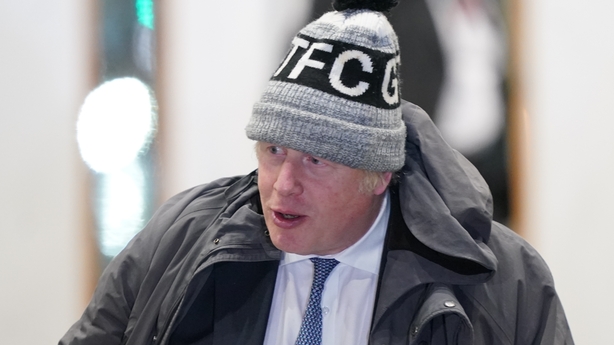Former British prime minister Boris Johnson has hit out at "absolutely absurd" portrayals of partying in Downing Street during the Covid-19 pandemic, as he faced a second day of questioning at a public inquiry.
Mr Johnson, 59, was forced from office last year after public anger at revelations about the series of lockdown-breaching parties dubbed "Partygate".
However, he insisted to the inquiry that perceptions of the scandal were "a million miles from the reality of what happened".
It follows him apologising yesterday for "the pain and the loss and the suffering" caused by the pandemic on his much-anticipated first day in the witness box, and accepting "mistakes" had "unquestionably" occurred.
Nearly 130,000 people died with Covid-19 in the UK by mid-July 2021, one of the worst official per capita tolls among Western nations.
Mr Johnson has faced a barrage of criticism from ex-aides for alleged indecisiveness and lack of scientific understanding, as well as for the Downing Street culture that facilitated "Partygate".
"I continue to regret very much what happened," Mr Johnson said when asked about the scandal, before branding "dramatic representations" of it "a travesty of the truth".
"The version of events that has entered the popular consciousness about what is supposed to have happened in Downing Street is a million miles from the reality of what actually happened," he added.
His aides and officials "thought they were working very, very hard - which they were - and I certainly thought that what we were doing was ... within the rules," Mr Johnson said.
Police last year fined the former leader - and his current successor Rishi Sunak - as well as dozens of staff for flouting the Covid-19 restrictions they set by attending drinks gatherings in Downing Street.
A parliamentary inquiry concluded Mr Johnson had repeatedly misled parliament over the parties, and he resigned as an MP shortly before its findings were published earlier this year.

Mr Johnson's pushback came as the lawyer for the inquiry - created to learn lessons from the country's response to the health emergency - grilled his contentious decision-making as the virus repeatedly re-emerged in 2020.
The ex-leader defended his choice to delay a national lockdown during a second wave of Covid, and his internal use of the phrase "let it rip" to refer to a possible so-called herd immunity strategy.
Mr Johnson claimed "plenty of people" were using the phrase to describe the potential strategy of shielding the vulnerable and allowing the rest of the population to acquire immunity.
He also disputed suggestions that offering financial inducements for people to eat out after the first lockdown was lifted - then-finance minister Sunak's signature policy - had caused a rise in infections.
"I can't see anything that conclusively shows that it made a big difference," he said.
"If it was safe to open hospitality, then it must be safe for people to go to hospitality."
In his first day of evidence, Mr Johnson repeatedly insisted he and officials did their "level best" and that his priority was always to save lives and the state-run National Health Service (NHS).
He appeared close to tears today as he pushed back on claims of "indifference" towards those with Covid, recalling his own hospitalisation with the virus.
"The NHS ... did an amazing job and helped me survive but I knew from that experience what appalling a disease this is," he said.
"To say that I didn't care about the suffering that was being inflicted on the country is simply not right."
But relatives of the bereaved have been highly critical.
Four women were evicted from the inquiry room yesterday after holding up signs stating "the dead can't hear your apologies".
Later, a crowd that had gathered outside the venue heckled loudly as he left for the day.
Mr Sunak will face the inquiry on Monday.
Johnson 'rather sad' his evidence is over
Speaking at the end of his evidence today, Mr Johnson said he was "rather sad" that his appearance in the witness box was over, adding that it was "very, very important" to get the answers as to how the virus originated.
He said that valuable testimony had been given to the inquiry, and he hoped it would help to bring the issues of health and social care together.
Inquiry chair Heather Hallett thanked Mr Johnson for his testimony, saying she knew "how difficult it must be to have two days giving evidence".
Mr Johnson replied: "No. I am rather sad that it’s over.
"I may not see you again, so I just wanted to say one thing, which is that I do think all the testimony and the evidence is incredibly valuable."
"The issues of health and social care are absolutely critical, and the government that I led was embarked on a big programme to try and bring them together.
"I think the fact that we had those delayed discharge patients was very, very difficult in the NHS.
"I hope that this inquiry will give a kick to the powers that be to make sure that we really address that."
Making a "final point", Mr Johnson concluded: "I know it’s outside your scope, but I do think that the British public and future governments will need to be elucidated about exactly how this thing originated.
"I don’t think the inquiry can look into it yourselves, but some sort of prod to the world to get the answer to the real origins of Covid, I think is going to be very, very important".
Additional reporting PA

